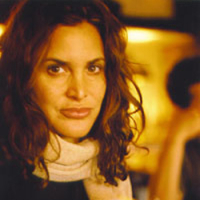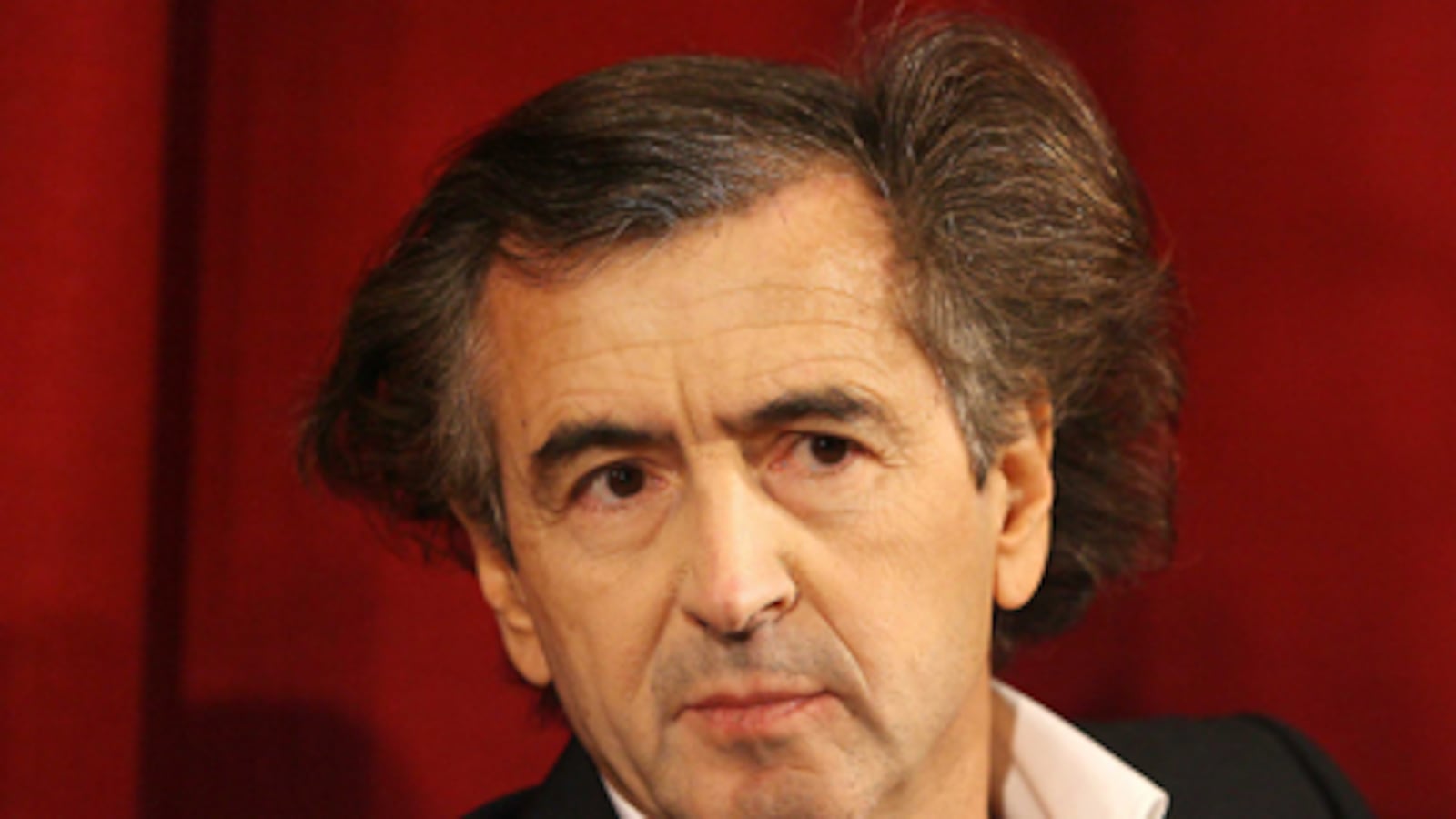The man in the immaculate white shirt is waiting in a lavish apartment in a discreet, elegant Parisian hotel just off the Champs-Élysées. The shirt's two or three buttons are undone, revealing a smooth, hairless, tanned chest for man of advancing age (63) and one who is renown for narcissism. At the door, he appears bemused, slightly impatient, yet polite.

He orders black tea from room service—the hotel is his home for the past few months, it turns out—and wanders through several sets of rooms to his study, a chamber littered with books, papers, and a sofa where he lounges, half on, half off. This is Bernard-Henri Levy, or BHL as he is known, possibly the most famous person in France besides Carla Bruni. I'm here to talk about his new book, Public Enemies.
Life has been incredibly kind to BHL, full of privilege and money and early success, but not without its harsh side. He is either loved or loathed, there is no in between. He gets mocked, ridiculed, and even set up by nasty journalists to humiliate himself by refuting Kant with fake philosophers (a stunt a journalist cooked up in 2010). One French headline about him declared: "God is Dead but My Hair is Perfect."
But despite the drama, and the numerous pages devoted to him in Paris Match, he is, it turns out, incredibly thick-skinned. This is someone who was once accused of having a Google Alert for every time his name gets mentioned in the press (he later denies this). "I don't care," he says of his detractors (and there are many), waving his hands. "It is not real life. Real life is my writing, my family, my work." He also says that if you know your work is good, who cares what other people think?
The same person who started that rumor about the Google Alerts also described BHL as "a philosopher without an original idea" who "dishonors even the white shirt you wear"; a Champagne socialist; "an intimate of the powerful who has since childhood wallowed in obscene wealth," and worse, "the creator of the most preposterous film in the history of cinema." The writer of those cruel words is now, bizarrely, one of his closest friends.
It is Michel Houellebecq, another French intellectual and writer, now in exile in Ireland, who describes himself in Public Enemies variously as a nihilist, misogynist, and redneck. MH is also not without his own traumas: He has been accused of inciting racial hatred; allegedly plagiarized; loathed by certain critics; accused of writing books that are a cross between Baudelaire and schlock. In short, this is not a man who people have gentle opinions about either. It was only a matter of time before these two enormous egos would clash—and try to slay each other.
But before this exchange of letters, the two barely knew each other, although I suspect they might have been jealous of the other. BHL tells me the real story behind the book. "One Sunday, I was exceptionally in Paris. And I had a text on my phone from this man—I hardly knew him, but it was clear he was in despair. It frightened me a little, I felt a man in such distress."
BHL proposed a drink, and the two met at the Ritz in Paris for dinner. They were the only clients in the grand, overdone dining room, and as French intellectuals will do, they talked endlessly. "I told him I thought he was brilliant, and he talked of his problems—my wife, this girl, the dog blah blah blah, living in Ireland, whatever, blah blah blah, being fed up with this and that." But the real point of Houellebecq's angst, it turns out was not the recession or his lagging sex drive or writer's block but the fact that "he had no one left to debate with." BHL says this with an air of great sadness, as though it was only he could rectify the dilemma.
So BHL replied he could not help him with the wife, girl, or dog issues, but he could help with the debate. "We decided to do it in writing, without the aim of a book, to be honest—it was for the pleasure of writing and debating." They start off insulting each other—Michel being the more cruel, BHL slightly on the defensive—and then ease into philosophy, their life stories (Michel's father was an independent ski instructor as opposed to one registered with the French state which seems to have scarred him for life; Levy was a spoilt brat), Celine, Proust, Romain Gary, Moses, faith. There is practically no subject or left unturned. Public Enemies could only possibly have been written in France, a country where one gets paid to be a philosopher, and can write Profession: PHILOSOPHE on their tax forms, and where intellectualism of the sturdy sort is still taken seriously.
Toward the middle of their conversations, when the two started delving into Judaism, the evil critics who torment them both, and mothers, they realized it was time to go to their mutual agent and produce the book. "And that," says BHL, leaning back on some cushions. "Is the real story."
BHL's own story is well-known, almost mythic, at this point. Born in Algeria to tremendous wealth—his father, Andre, was a timber multimillionaire who later sold the company to Francoise Pinault in 1997—BHL is a product of France's elite grande écoles and launched his journalistic career writing for Camus' resistance-era newspaper Combat.
BHL fell in love with Bosnia. “It symbolizes the crossroads of all my beliefs—multiethnic culture. Sarajevo was like the Spanish civil war. It was a love story.”
He taught at the University of Strasbourg, and founded a new school of anti-Marxist philosophers, hung out a lot in Cafe Flore, married several beautiful women (including Arielle Dombasle, the muse of the late Eric Rohmer), and kept writing books. In between books, he found his passionate causes. The man is not without courage. He showed up in the white shirt (and I seem to remember a theatrical cape of some sort) in Sarajevo, starting at the most dangerous period in May 1992 to make documentaries and try to drum into the heads of the pro-Serb French the evils of ethnic cleansing and genocide.
And age is not withering him. On the contrary, he seems to be getting younger. He writes for French, American, German, Swedish, Italian and English newspapers and keeps going to unknown wars that are off the map. A few years ago, he proposed to the editor of Le Monde to send him to cover stories no one else bothered with. He ended up in Burundi, Angola, Sri Lanka, Colombia, and the Nuba Mountains of Southern Sudan (where, he tells Houellebecq "People hadn't seen a white person since Leni Riefenstahl.")
He was headed to Kashmir when a fever knocked him out. Whereas Houellebecq complains about aging ("Well, I'm getting old now, I'm getting weaker. I would like to be happy before I die. So I think I'll go back to Russia."), BHL seems to keep refueling, ready to take on the next assignment.
"I don't feel particularly old doing this kind of reportage, any older than the soldiers I am with," he says. He tells a story of crossing into Darfur from the Chad side four years ago, when he was 59. Getting into Darfur from that side is not an easy feat, and he was alone with a small group of very young rebels. The only time he felt nervous was when the Janjaweed militia were a few miles off and the rebels casually lay down to sleep. "And what could I do? Sleep? Never! All I could do is pull out my book and try to wait!"
Does he ever feel scared? "Of course! The moment I put my feet on the ground I wonder what I am doing here! I remember being in the Eritrean war in 1980 and thinking… how did I get here?" He says he hates all wars. But, like most of us who reported the conflict, he fell in love with Bosnia. "It symbolizes the crossroads of all my beliefs—multiethnic culture. Sarajevo was like the Spanish civil war. It was a love story. My only regret was that I did not get there earlier, before the war, and see it in 1985. My dream would have been to see it in peacetime."
Perhaps the real pleasure of Public Enemies is that the true personalities of both of these very strong characters are revealed. The press tortures an anguished Houellebecq, who retorts: "I had sometimes felt like Kurt Cobain telling a tactless interviewer, "I'm homosexual, I'm a pagan, I'm a drug abuser, and I like to fuck pot-bellied pigs! Is that enough?"
As for BHL, I left after more than an hour pleasantly surprised at his self-deprecating humor: He may be vain, but at least, as the British say, he knows how to take the piss.
Plus: Check out Book Beast for more news on hot titles and authors and excerpts from the latest books.
Janine di Giovanni reported on conflict and war for nearly two decades for the Sunday Times and the Times of London. A National Magazine Award winner, she moved to Paris in 2004 and serves as a contributing editor to Vanity Fair. The author of four books, she's at work on a book for Knopf/Bloomsbury about Parisian life.






